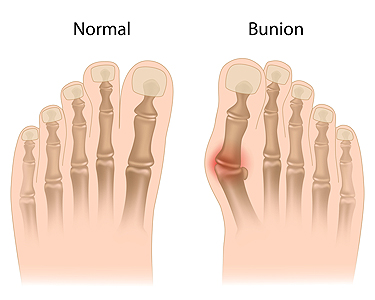
A bunion is a bony bump that forms at the base of the big toe as the tip of the toe shifts inward toward the others. Common causes include genetics, wearing tight or narrow shoes, arthritis, and foot structure abnormalities. Symptoms typically involve pain, swelling, redness, and difficulty walking, along with visible changes in foot shape. Bunions can feel sore, stiff, or even numb, and may worsen over time, if left untreated. A podiatrist can help by evaluating the severity of the bunion and developing a personalized treatment plan. Options include footwear recommendations, custom orthotics, pain relief strategies, or, in more advanced cases, bunion surgery. Early intervention is key to preventing long-term discomfort and deformity. If you have a painful bunion, it is suggested that you schedule an appointment with a podiatrist who can offer effective relief and treatment solutions.
If you are suffering from bunions, contact Manisha Mehta, DPM of Detroit, MI. Our doctor can provide the care you need to keep you pain-free and on your feet.
What Is a Bunion?
A bunion is formed of swollen tissue or an enlargement of boney growth, usually located at the base joint of the toe that connects to the foot. The swelling occurs due to the bones in the big toe shifting inward, which impacts the other toes of the foot. This causes the area around the base of the big toe to become inflamed and painful.
Why Do Bunions Form?
Genetics – Susceptibility to bunions are often hereditary
Stress on the feet – Poorly fitted and uncomfortable footwear that places stress on feet, such as heels, can worsen existing bunions
How Are Bunions Diagnosed?
Doctors often perform two tests – blood tests and x-rays – when trying to diagnose bunions, especially in the early stages of development. Blood tests help determine if the foot pain is being caused by something else, such as arthritis, while x-rays provide a clear picture of your bone structure to your doctor.
How Are Bunions Treated?
- Refrain from wearing heels or similar shoes that cause discomfort
- Select wider shoes that can provide more comfort and reduce pain
- Anti-inflammatory and pain management drugs
- Orthotics or foot inserts
- Surgery
If you have any questions, please feel free to contact our office located in Detroit, MI . We offer the newest diagnostic and treatment technologies for all your foot care needs.
